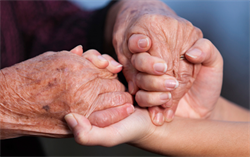 The need to improve care for patients with serious, complex and potentially life-threatening or life-limiting medical conditions is unquestioned. Implementing a palliative care program helps to prevent and relieve suffering and supports the best possible quality of life for patients and their families through communication, shared decision making, holistic care and continuity of care.
The need to improve care for patients with serious, complex and potentially life-threatening or life-limiting medical conditions is unquestioned. Implementing a palliative care program helps to prevent and relieve suffering and supports the best possible quality of life for patients and their families through communication, shared decision making, holistic care and continuity of care.
Palliative care is specialized medical care for people with serious illnesses. It is a specialty that focuses on relieving pain and suffering. Palliative care uses a team approach to address the needs of patients and their families, ensuring comfort and relief of symptoms with the goal of improving quality of life. This team is comprised of doctors, nurses and other specialists who work with a patient's other doctors to provide an extra layer of support. Palliative care is appropriate at any age and at any stage in a serious illness and can be provided together with curative treatment. It is not designed to replace treatment; rather it complements the primary treatment received by the patient.
Many of the symptoms addressed by the palliative care team include pain, shortness of breath, fatigue, anxiety, depression, constipation and anorexia.
Who Can Benefit from Palliative Care?
Palliative care is appropriate for anyone diagnosed with a chronic, progressive or serious illness. This includes, but is not limited to, heart, kidney, liver or respiratory disease, cancer, stroke or a neurological disorder.
The palliative care team often includes a combination of: physician, advanced practice nurse, nurses, pastoral care, social work, case management, dietician, pharmacist, physical therapist, speech therapist, occupational therapist and respiratory therapist.
Is Palliative Care the Same as Hospice?
No. Hospice is designed to provide care for those approaching the final stage of life. Hospice care focuses on relieving symptoms and supporting patients with a life expectancy of less than six months. Palliative care allows the potentially curative treatment to continue where appropriate while focusing on relieving the symptoms that may come with the disease progression or the treatments received.
What is End-of-Life Care?
End-of-life care is given during the time surrounding death. It is medical care that ensures comfort to those with a terminal illness or terminal condition that has become advanced, progressive and incurable. These often include both the physical aspects of suffering, along with the psychosocial and spiritual factors that interplay with patients who have an advanced illness. Palliative care providers are trained specifically to deal with the many aspects of suffering present in a patient approaching end of life, thereby easing anxieties for the patient and the family.
"At the end of life, each story is different. Death comes suddenly, or a person lingers, gradually failing. For some older people, the body weakens while the mind stays alert. Others remain physically strong, and cognitive losses take a huge toll." – End-of-Life Care: Helping with Comfort and Care. National Institute of Aging, 2008 www.nia.nih.gov.
Comfort Care
Comfort care is an essential part of medical care at the end of life. It is care that helps or soothes a person who is dying. The goal is to prevent or relieve suffering as much as possible while respecting the dying person's wishes and maintaining his or her dignity.
Comparison of Services
|
Palliative Care |
Hospice |
End-of-Life Care |
Comfort Care |
| Interdisciplinary Team |
 |
 |
 |
 |
| Treatment to Improve Quality of Life |
 |
|
|
|
| Diagnostic Testing |
|
|
|
|
| Bereavement Support |
 |
 |
 |
 |
| Social Support |
 |
 |
 |
 |
| Psychosocial Support |
 |
 |
 |
 |
| Curative Treatment |
 |
|
|
|
| Symptom Management |
 |
 |
 |
 |
| Treatment to Improve Function |
 |
 |
|
|
Once educated, consumers are extremely positive about palliative care and want to have access to this care.
According to a recent poll by the American Cancer Society and the Center to Advance Palliative Care:
- 95 percent of respondents agree that it is important that patients with a serious illness and their families be educated about palliative care.
- 92 percent of respondents say they would be likely to consider palliative care for loved ones if they had a serious illness.
- 92 percent of respondents say it is important that palliative care services be made available at all hospitals for patients with a serious illness and their families.